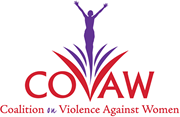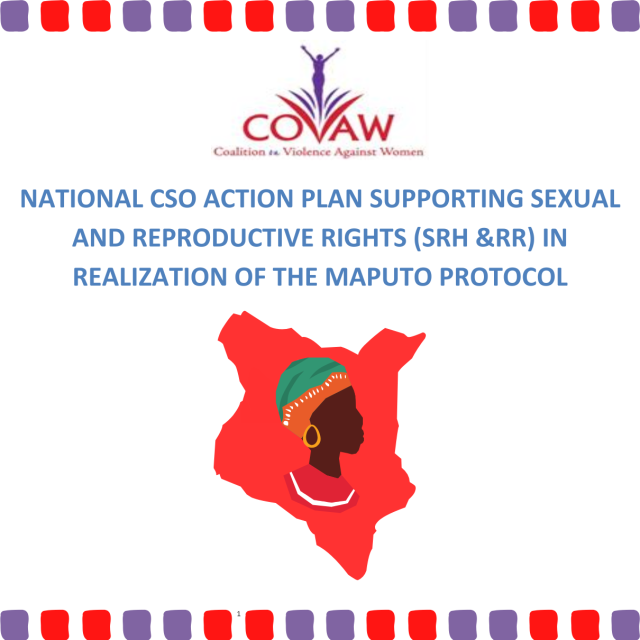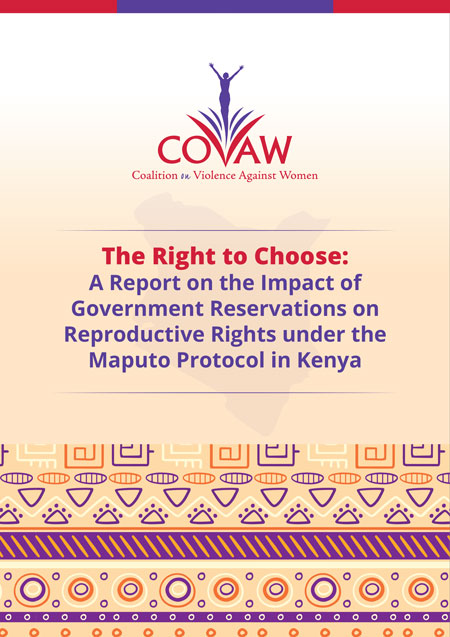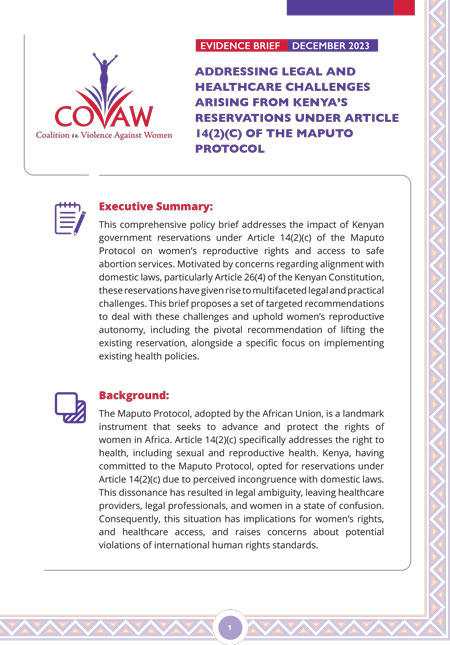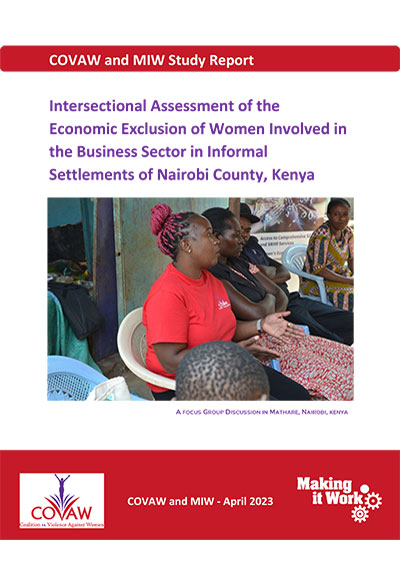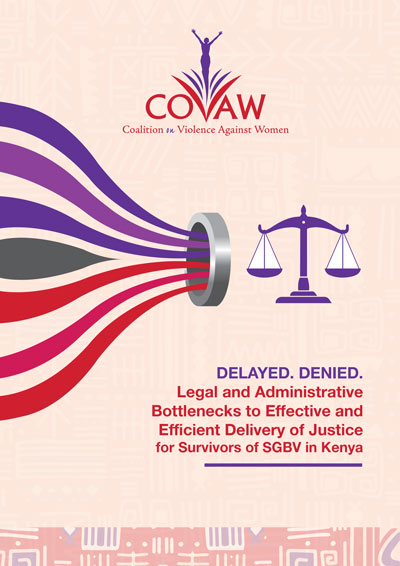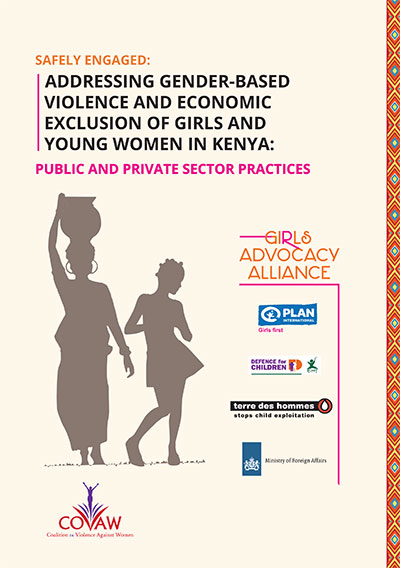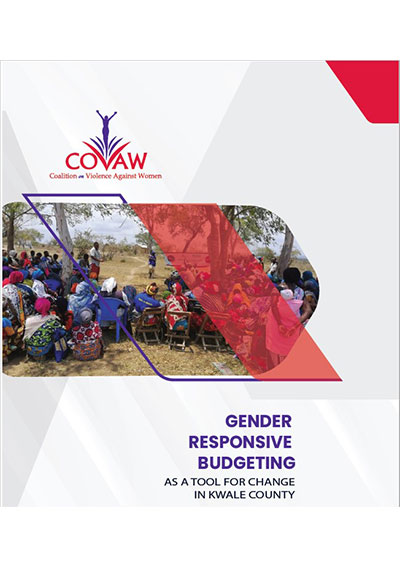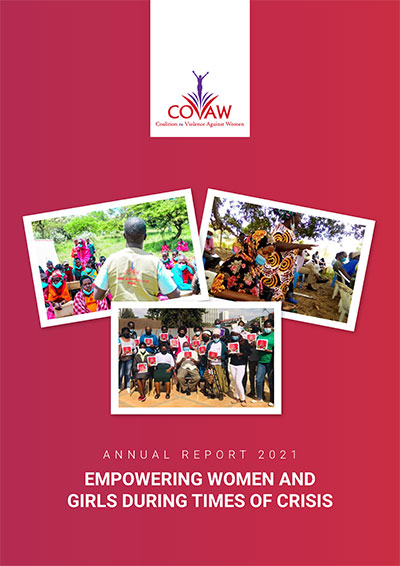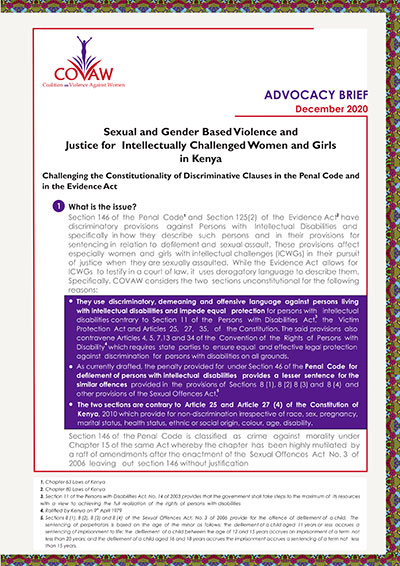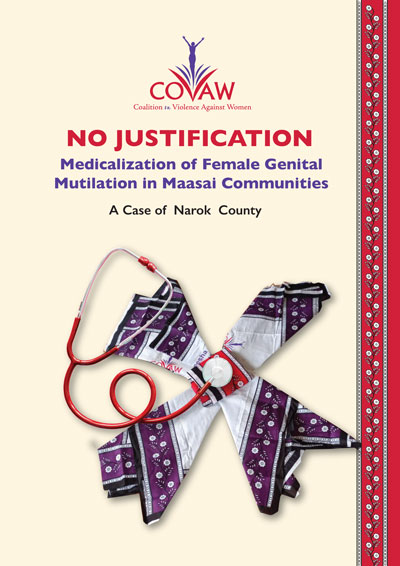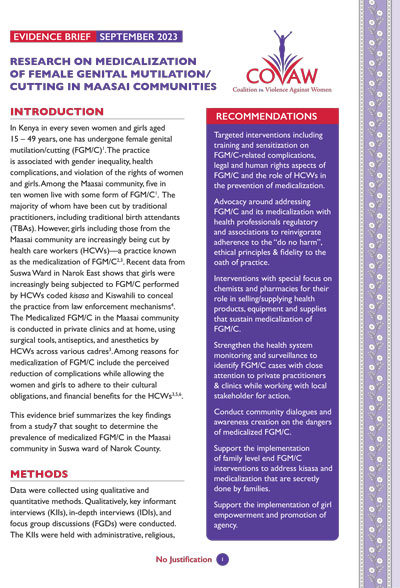National CSO Action Plan supporting sexual and reproductive(SRH&RR) in realization of the Maputo Protocol
The realization of the sexual and reproductive health and reproductive rights (SRH &RR) of women and girls in Kenya, continues to be challenged owing to a legal and policy framework at national level containing several laws that are not aligned to each other. Additionally, this framework does not reflect the normative standards to which Kenya has committed itself through the ratification of binding regional and international instruments on the rights of women and girls.
Kenya is a State Party to the Protocol to the African Charter on Human and Peoples’ Rights on the Rights of Women in Africa, hereinafter the Maputo Protocol. The reservation that Kenya placed upon ratification of this important instrument, stands in the way of the full enjoyment the SRHandRR by women and girls in Kenya.
This National CSO Action Plan (Action Plan) supporting SRH &RR in the realization of the Maputo Protocol is designed to be relevant, measurable, achievable, forward-looking, and continually informed by the lessons from the engagements of stakeholders, and regular research to build evidence to buttress all the actions contained therein.
The Right to Choose: A Report on the Impact of Government Reservations on Reproductive Rights under the Maputo Protocol in Kenya.
This study examines the impact of the Kenyan Government’s reservations to Article 14(2)(c) of the Maputo Protocol, focusing on women’s rights and reproductive healthcare access within the country. Kenya ratified the Maputo Protocol in 2010 but placed a reservation citing inconsistencies with domestic laws.
The study urges us to scrutinize the impact of policies on the ground, challenge assumptions, and envision a future where reproductive rights are celebrated as an integral part of human rights. May this work inspire conversations, policy reforms, and positive changes in the lived experiences of women and girls in Kenya and beyond.
This study was part of a one-year (2023) project titled Securing Change: Popularizing and Strengthening the Implementation of Maputo Protocol in Kenya. The project had been funded by the Swedish Development Cooperation through Equality Now and SOAWR.
Addressing Legal and Healthcare Challenges Arising from Kenya’s Reservations under Article 14(2)(c) of the Maputo Protocol
This comprehensive policy brief addresses the impact of Kenyan
government reservations under Article 14(2)(c) of the Maputo
Protocol on women’s reproductive rights and access to safe
abortion services.
Motivated by concerns regarding alignment with domestic laws, particularly Article 26(4) of the Kenyan Constitution, these reservations have given rise to multifaceted legal and practical
challenges.
This brief proposes a set of targeted recommendations to deal with these challenges and uphold women’s reproductive autonomy, including the pivotal recommendation of lifting the existing reservation, alongside a specific focus on implementing existing health policies.
Intersectional Assessment of the Economic Exclusion of Women Involved in the Business Sector in Informal Settlements of Nairobi County, Kenya
COVAW in partnership with the Humanity & Inclusion Making It Work project, worked on the in-depth assessment on the economic exclusion of women involved in the business sector in informal settlements of Nairobi County, using an intersectional approach.
This study was part of a six-month cooperation with the MIW Gender and Disability project. The main objective of this assessment was to understand how women in their various diversities face different barriers in running sustainable economic businesses and how these barriers can be addressed.
This assessment was carried out between the months of March 2022 -August 2022. This cooperation also served the purpose of improving and enriching the How-To Guide: Intersectionality in practice, co-developed by Inclusive Friends Association and MIW and published in May 2022.
DELAYED. DENIED. Legal and Administrative Bottlenecks to Effective and Efficient Delivery of Justice for Survivors of SGBV in Kenya
This research study was part of a 2-year project entitled “Promoting an Enabling Legal Environment for SGBV Victims” that COVAW undertook with the support of OSIEA. The overall goal of the project was to improve response to SGBV against women and girls.
The study aimed to inter alia review the law, policy and administration structures within the judiciary that govern management of cases of sexual violence so as to establish the causes of delays in delivering justice to survivors of SGBV particularly those with intellectual
disabilities.
SAFELY ENGAGED: Addressing gender-based violence and economic exclusion of girls and young women in Kenya.
The purpose of this study was to establish the role of the formal and
informal private sectors in addressing Gender Based Violence (GBV) and Economic Exclusion (EE) for vulnerable girls and young women in Kenya, with particular focus on Nairobi (in the informal settlements of Kibera), Kwale and Kisumu Counties, with the broad objectives of:
- Assessing the policy framework, regulations, and practices by the private sector on GBV and EE of young women and girls in Kenya.
- Reviewing the Corporate Social Responsibility (CSR) policies and practices of the formal and informal private sector in targeted counties and at the national level.
Gender Responsive budgeting as a tool for change in Kwale County
The aim of the project was to empower marginalized women, girls and PWDs by ensuring that they participate in the county budget making process to promote their priority needs in the county budget.
COVAW commissioned a study to assess the extent to which the project objectives were achieved, in the final year of the project. The study employed both primary and secondary sources of data.
Annual report 2021: Empowering Women and Girls during times of crisis
It is with great pleasure that we present the COVAW 2021 Annual Report. 2021 was yet another challenging year, marked by increased cases of Sexual and Gender Based Violence and continued effects of COVID-19 pandemic – all compounding factors to vulnerability.
This annual report provides a glimpse of our efforts to serve vulnerable women and girls exposed to or at risk of gender based violence.
In Kenya, regardless of constitutional and statutory provisions, access to justice remains elusive to most victims of SGBV. The inordinate delays in conclusion of cases have led to untold trauma with the attendant social-economic consequences to the victims, their families and the society at large. COVID-19 pandemic worsened the situation by exacerbating the hitherto gaps in case management in the judiciary. Women and girls, particularly those with intellectual and psychosocial disabilities remain the most adversely affected.
Sexual and Gender Based Violence and Justice for Intellectually Challenged Women and Girls in Kenya
Challenging the Constitutionality of Discriminative Clauses in the Penal Code and in the Evidence Act.
NO JUSTIFICATION : Medicalization of Female Genital Mutilation in Maasai Communities. A Case of Narok County .
Female genital mutilation/cutting (FGM/C) has persisted despite its impact
on human rights, gender equality and health of women and girls in the world. Interventions for addressing FGM/C in Kenya have continued to bear fruits with the national prevalence as of 2022 reported at 15%.
Despite the decline associated with robust interventions, there are notable geographical and ethnic variations in FGM/C prevalence. For example, Narok county had unacceptably high (78%) FGM/C prevalence in 2014 characterized by slow decline that currently stand at 51% (2022) as well as emerging reports of medicalization (FGM/C performed by health workers using health supplies).
In Narok County, the Coalition of Violence Against Women (COVAW) has been implementing end FGM/C programs there. COVAW have identified the emerging trend of medicalization and Kisasa type of FGM/C in the Maasai community.
Research on medicalization of female genital mutilation/cutting in Masaai communities.
In Kenya in every seven women and girls aged 15 – 49 years, one has undergone female genital mutilation/cutting (FGM/C)1. The practice is associated with gender inequality, health complications, and violation of the rights of women and girls.
Among the Maasai community, five in ten women live with some form of FGM/C1. The majority of whom have been cut by traditional practitioners, including traditional birth attendants(TBAs).
However, girls including those from the Maasai community are increasingly being cut by health care workers (HCWs)—a practice known as the medicalization of FGM/C2,3. Recent data from Suswa Ward in Narok East shows that girls were increasingly being subjected to FGM/C performed by HCWs coded kisasa and Kiswahili to conceal the practice from law enforcement mechanisms4.
